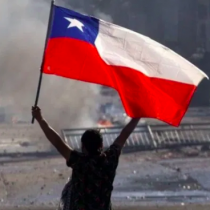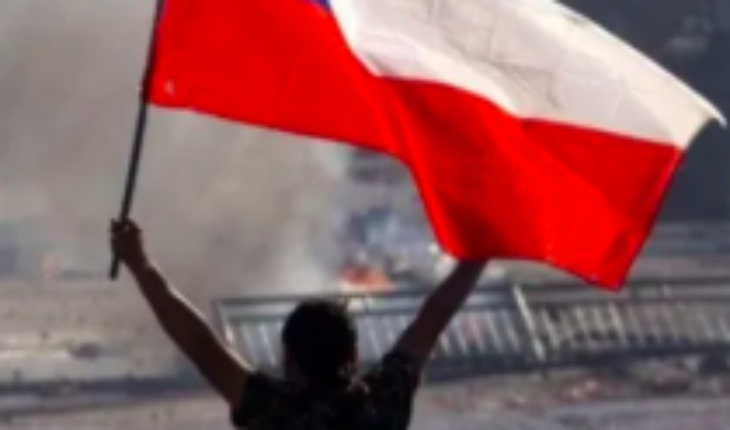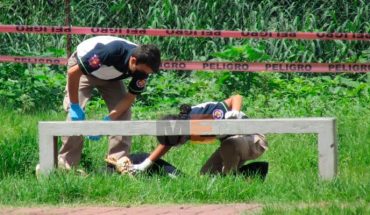
After the March 8 Women’s Day march, it seemed that the social mobilization initiated on October 18, 2019, would lead to a long-running confrontation with views of emerging organization from society, as opposed to a state that sees itself as oppressive. On Fridays in March they became small repetitions of the social outburst and a 29 March day of the young fighter was expected with a high level of conflict. Reasons for this were left over: there was no progress in the changes to the unstorutional legal framework that responded to the demands most expressed during the outburst: unequal treatment in all possible areas between the privileged group and the absolute majority of society; a pension system that does not impoverish; a decent health system; a free public education system, articulated to social, cultural, political and economic needs, where democratic coexistence takes place; among others. Nothing new: everything that has emerged years ago in different forms of mobilization. Far from this, what was happening was increasingly draconian legislation with non-eliteers versus a wide sleeve towards this group. This perception had only increased since the social outburst, with the 2500 political prisoners of the revolt and the repressive killings that reached the event of in February and March (Jorge Mora, Ariel Moreno and Cristián Valdebenito), among other violations of the HRDs that had been denounced (even) by the UN.
And then came COVID – 19.
In political and military history, chance has been an issue and/or problem since very old. Already Plato in the Laws used the formula of chance to reflect on the limits of political action: “all human businesses are not in short but random”. However, it is the founder of the discussions about the modern state and its reason, Machiavelli, who made this a problem to consider as a theoretical foundation of both the political and the military. Well, it is difficult to believe in political action (i.e., one that can change the “natural” course of economic and social structure), if we take into account only the role that chance plays, the event, the chance, the Fortune. If it all depends on chance, the spontaneity of the conflict, then no strategy makes sense. This, in Clausewitz’s words, the strategy is the use of combat for the purposes of war. And if the ends cannot be achieved with planning, preparation and coordination, then the strategy doesn’t make sense.
Of course, it can be answered from Arendt that there is no politics where there is war, because it is born of dialogue and the search for common living, but, this is another discussion. It is the old debate about how ethics (theory) should be linked to politics. Let’s leave this issue, for now.
Let us at least agree that in the context of a realistic policy, the military aspect is central to the analysis of the correlation of forces and the ability to transform or maintain the system (block in power, in terms of Gramsci) and, to that extent, there are three fundamental processes. The formation of the military order that allows to sustain the political order, the moral strength of this military order that maintains and nourishes the collusion with the rest of the block and the semiotics, in the words of Fernando Buen Abad that is articulated between military strategy and politics, that is, the conceptual structure and signs that make the moment and order interpretable. Piñera built the semiotics of the social crisis on the basis of war. For example, with the installation of the idea of a foreign attack and arranged in the 18 October uprising. This semiotics is central to developing a repressive strategy that leads to the annihilation and exhaustion of the enemy. Thanks to this idea, human rights violations and repression are legitimized, isolated cases and protocol failure.
On the other hand, to ask about the strategy in the framework of the mobilization emerging since the 18th – Or I think it is complex, because there was no group directing the mobilizations, although some sectoral leadership was emerging. But, I think, the real problem with analyzing the strategy of the mobilized is that there were two different purposes that were pursued. Following Clausewitz again, every war has a goal. This also applies in policy. As in the old days, the mobilized groups were divided between reformers – petitioners (i.e. they expect answers from the institutional set- and revolutionaries – autonomists (who act on the outside and in conflict with the state and its co-optation). The former aimed to create a new legal framework that was in line with ideas of a type of state and institutionality inspired by the republican tradition, in the words of Agustín Squella or Renato Cristi, who goes so far as to propose to restore the Constitution of 1925 to make the reform from it (Abecedario of the Constitutional Moment). Meanwhile, the latter believed possible the creation of a new historical block capable of channeling rabies, the bronca with the daily horror to which the pension system, health, transport, labor, educational and, of course, legal, to make the board jump and generate a real original constituent power with political expression in profound transformations to the whole system and not just the legal one. Today, it seems to me that both strategies are baffled by the social impact of COVID – 19. The strategy of each of them is exceeded hereunder. However, despite the crisis, I believe that only one of the two strategies is at risk due to the political management of the crisis by the Government, trying to build common sense from the market and the individual. Unintentionally one of the 2 strategies ends up infected with the same virus.
The government would have a perfect opportunity to reposition itself politically, as social and economic crises such as the COVID pandemic – 19, produce fragility. Faced with this, following Byung-Chul Han (The Viral Emergency and tomorrow’s world, we can describe the attitude of the world’s governments as of two types: statesmen and centralizers versus liberalizers and individualizers. In the former, the State appears as the guarantor of the social order. This can be variable, from invasive formulas of private life (China or Korea) to regulations that privilege employment and social security (Spain or Argentina). Despite this, they have in common the development of an incipient and diffuse nationalism that is built on the ability to deal with the crisis efficiently in the number of fatalities and human losses. In the second, the appeal has been to the individual, his freedoms, his ability to decide and his expression in the capitalist economy. Also, here, the response has been variable, coming to extremes such as defending a form of eugenics (especially by appealing to the high cost of people in the 3rd age, for example, in the IMF’s Global Financial Stability Report (GFSR), the 2012 mockery of journalists and health specialists calling quarantine (Bolsonaro) or pointing out that 200,000 dead is a successful figure in the management of the pandemic .Trump). But, beyond one or the other, it is clear that nothing will be the same politically after the pandemic. It may be a general essay on dystopia, in the words of Luca Dobry or the emergence of the new communism, as Zizek proposes, but it will undoubtedly involve significant changes in political forms and structures. From the way the EEC follows to the new role that China will take on. The scope of possible changes is incalculable.
For the neopopulist rights it is time to apply what Naomi Klein (Marie Solis interview to Naomi Klein) calls capitalism of catastrophe and the doctrine of shock, that is, the use of fear and helplessness as a tactic to control the population and impose unpopular policies. At these stages governments are free to develop the political and military objectives that benefit their power bloc. This is the strategy, with small modulations, of the neopopulist rights worldwide. There are few differences between Trump, Bolsonaro, Lenin Moreno or Piñera, when dealing with the pandemic. It is an excellent opportunity to do business, get rid of the most expensive population in social spending and control social mobilizations, in the case of Chile and, less, Ecuador.
The best expression of this was given to us by the phrase “the coronavirus is the best thing that could happen to Chile”. It was the bragged manifestation that death and suffering does not matter when it comes to preserving privileges.
From a political and military point of view, it seems to me that the month of March will end with a kind of truce imposed by the circumstances, which objectively and materially benefits the bloc in power, because it allows it to continue to tighten the legal and repressive apparatus against the most radical sectors of the outbreak of 18 October. It has political hegemony (built in media, surveys, thinks thank, among others) and the use of military force to do so. However, I believe, that this initiative will be expressed as fetable and short-term, because, as well as a strong government with a moral foundation capable of mobilizing, it is strengthened from crises, one weak faces historical forces that tend to reduce it to ashes. Such a policy in the US, Brazil or Ecuador is not the same as a country that comes from a social (and political) crisis as widespread and extensive as Chile.
Moreover, it seems that one of the bloc’s problems in Chilean power is today its fragmentation. Although hiss interests are clearly defined and articulated and they have an administrative and political apparatus willing to do everything necessary to benefit them and even one of them is in the Currency, express a significant degree of moral degradation Clausewitz’s words. Although the media in the hands of this same bloc has silenced and invisibilized the human rights violations committed up to the day before the coronavirus crisis, they have not been erased, as they are still being experienced in the popular areas of the Country. Even if we are under the control of the repressive and military forces today, it is not possible to forget that they have full commands involved in corruption. And, despite the fact that they could follow the tactics developed by different business groups around the world, making themselves available to the social systems on which they are located, our business elite has done the opposite.
The uns pointed problem with this is that it does not take into account moral factors, which, as Clausewitz points out, “form the spirit that penetrates even the last detail of it (the war) and those who first join with a narrow affinity to the will , which directs and moves the entire mass of forces, forming, so to speak, unity with it, which, in turn, is also a moral factor.” It is this lack of linkage between the moral factors represented by the bloc in power versus those of social mobilization that, I believe, will determine the outcome of the mobilizations initiated in October and which today faces a pseudo truce or low in the Actions.
If the real and material moral articulant shown in its statements the dominant bloc is prey, corruption armed with common losses and all this underpinned by the emerging fabric of dictatorship and transitional agreements, then these factors come as opposed to the self-interest that the bloc ideally wants to represent: individual profit. Well, it is difficult to believe in a nationalism that does not protect the nation, a defense of economic freedom underpinned by the of the state (which, moreover, wants to be dismantled) and the constant expoliation of work from foresight to health, while being a paladin of the defense of life. A nation with thousands of its inhabitants starving to not receive their wages, with much of the oldest generation being extinct, with businesses between the state and private to set up hospitals in the area where the richest live and, what we still don’t see , the casualties by COVID – 19 concentrated in soldiers and not on officers (Antuco formula), will be reliable demonstrations of this dissonance between ideality and material reality. History is full of examples of this situation.
It was this element that led Machiavelli towards the concept of virt, that is, very similar to what Clausewitz later called moral factors. The Florentino realizes that a ruler or government whose virto is not up to the task, however much he faces extraordinary historical circumstances, which could bring him glory and civic immortality, not only will he not be able to profit from this circumstance historical, but it will be this same that will lead to its fatal outcome. The fall of Constantinople was due both to the artillery and to the state of decomposition in which Byzantine society and its rulers were located. Nicholas II’s actions that led him to trust Rasputin or want to lead World War I from the dream-based frontline are expressions of a multiple number of historical events that corroborate what was pointed out. While the bloc remains in power he is able to invisibilise and silence this decomposition of his virto, or moral factors, but once he collapses they become evident even to his former defenders when they are on disbandment after defeat.
The infinite number of statements and actions put Piñera on an equal footing with Bolsonaro, Trump or Lenin Moreno and make the government’s strategy a constant expression of the dissociation between words and deeds. The problem in this context is not lying, but the weakness of the lie when everyone knows it is.
However, I think it is possible to point out that the worst of all for the dominant bloc lies in the moral breakdown and the inability to adequately direct the political objectives of society and national interests, read in the military key. This decomposition may end up passing the bill to the only fuse that still makes the interclassist agreement that kept it in power (to the bloc) work, after the revolt that began on the 18th: the constitutional plebiscite.
If we accept that the contradictions will become increasingly noticeable, the situation becomes highly conflicted. Consider only those that we have already seen emerge: million-dollar losses in the individual accounts of the AFPs, a material expression of the educational crisis in connection with virtual education, the unprotection of workers in the opinions of the Directorate of the Work under the Ministry of the area, economic plans aimed at the protection of capital in the waste of the poorest groups to which only debts will be apportioned, hospitals mounted on profit in sectors of the city where the Privileged. The examples are left over and sure the regions of the country can contribute a significant amount that are silenced and invisibilized from Santiago. The problem is systemic and it goes through entire sections of the social world.
So, I think, that the most consistent formula for defining this behavior is speculation. When there are no possible answers because there is no virt, it is only left to rely on chance or Fortune, such as that the virus mutes and becomes a good person.
But, the problem with this tactic is twofold. First, it shows the explanation of the constant errors of political communication made. For Machiavelli, the inability to change behaviors when fortune changes leads to failure. Secondly, trust in prior knowledge, underpinned by the sound of luck on previous occasions, this time it will also. One of the faults is because of the inability of one’s action, the other is because of the weakness of the judgment and the inability to project a plan.
For example, in the case of COVID – 19 is the opportunity to address the crisis with a different perspective where the person is passed over the economy. This was a recommendation from his political analysts, as a diagnosis of the government’s lack of empathy prior to the social outburst, exemplified in phrases such as getting up earlier, giving away flowers, crowding office to make social life, among many others. But, the political communication of COVID – 19 has shown the opposite: even if it has happened on previous occasions (the endless pandemics that have whipped us in the last 3 decades?), telling a worker that the Directorate of Labour agrees with a mega or large company, which won’t pay your salary, it’s brutal. Having 2500 people imprisoned while “investigating” them for crimes and crimes in a revolt that had 80% support in polls of the same power, is ruthless. Building a hospital with the best supplies in a place that most of the people of the country don’t even know where it is is burlesque. Apportioning debts and building subsidies on the mock dismissal (payment of cesanty insurance), is simply, delusional, and would give, laughter, if not terrible in its human dimension.
Countries that have succeeded in politically managing the pandemic have done the exact opposite of the Chilean government: they have not acted as speculators and have protected the weakest in society. State and social security instead of business and fuiles.
That is why I believe that, without wanting it, the great one who is badly harmed by the crisis and the mismanagement of the government may end up being the plebiscite. From now until October there are seven months left. In the petitionist strategy it will be very difficult to explain how, despite 18 October, the legislative process that harms workers continues to advance, while being old and poor becomes a death sentence. Class contradictions and the systemic impossibility of processing measures to address them may end up being the material demonstration of a plebiscite that has more and more mornings and fine print. After all, it is hard to trust the promises of power when the institutionality itself in charge of protecting work says that wages can be stopped and that this is legal.
In such a context, positions can emerge that boycott the process from within. For example, there may be a call to vote on an endorser, but to overturn the vote that defines who will draft the Constitution. If he wins the null, what does he gain? How does the institutional order process a scenario like this? Will you say it’s another million and a half people marching to support the government’s actions?
Meanwhile, the best and most brutal expression of this inequality is the 2500 political prisoners, while impunity prevails in human rights violations.
At these limits, the individual ethics of the privileged and their concern and responsibility for the weakest serves little. “The quartering that many perform today, aware of belonging to a group of privileged people who can work from a distance, seems to me one of the most inspiring and supportive acts that have occurred in recent months,” says Dr. In Philosophy, Diana Diana Aurenque in the Matrix and Pandemic: Rethinking Humanity. The problem with this, I think, is that no matter how inspiring the act, it is of little use when the poor face their material reality. Finally, those who were “taken care” thanks to the self-care of the privilegedyou should have kept going out to work. In the material life of the organized popular world, individual action is overwhelmed by coordinated collective action. This collective action may need to be taken care of in the coming months to meet material needs, such as feeding and protecting the elderly in populations and camps, and whether this is as much or harder in the regions. There are times of pain and suffering for the poorest. I think that a slogan as only the people help the people is a much more real binder and materially linked to the degree of territorial organization in the context of the post-18 October mobilizations. In this area, virtual networks show their limit, because, although they serve to inspire, they do not change a drop of the material and class conflict that goes through politics and the construction of humanity itself. While the ethical response of the privileged can draw sighs from the well-meaning Chilean intellectuality, at the time of ethics, the one that the popular subject builds is not individual, but collective and is not based on privileges, but on material needs. Perhaps, for that reason, it is not only ethical, but also political… Always.
Expressions such as “this did not ignite” or the possibility that the virus will become “good person”, are the contrasting version of the above. In them, I believe that there is a deep bond: the contempt of the elite and the total ignorance of the one whom he despises. That is why he needs to rely on luck, that good fortune will smile upon him, as he has always done. When successful with a particular procedure it is difficult to convince yourself of the desirability of changing it, as Machiavelli says.
CoVID – 19 may end up being the best drug against authoritarian – neoliberal poison, but not because it brings about a new humanity or a new communism, as Zizek thinks, but because old humanity and forms of popular solidarity are there , never left, no way of dusty than they left after the end of the story.
Winter truces are therefore useful, thus allowing to quantify losses, analyze positions, rest, rebuild morale and prepare for a return to the fight. They allow us to take care of that other half of our destiny that does not control fortune. Today, I think that’s about saving the 2500 political prisoners the state seeks to let die in its repressive prisons. This is an urgent and necessary ethical and political responsibility.
The content poured into this opinion column is the sole responsibility of its author, and does not necessarily reflect the editorial line or position of El Mostrador.





